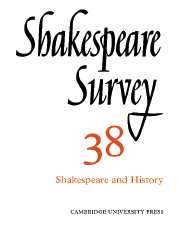Book contents
- Frontmatter
- Shakespeare’s History Plays: 1952–1983
- Shakespeare and History: Divergencies and Agreements
- Shakespeare’s Georgic Histories
- The Nature of Topicality in Love’s Labour’s Lost
- The Tragic Substructure of the Henry IV Plays
- Hal and the Regent
- The Rite of Violence in I Henry IV
- The Fortunes of Oldcastle
- Hand D in Sir Thomas More: An Essay in Misinterpretation
- Livy, Machiavelli, and Shakespeare’s Coriolanus
- Henry VIII and the Ideal England
- The Strangeness of a Dramatic Style: Rumour in Henry VIII
- ‘Edgar I Nothing Am’: Figurenposition in King Lear
- ‘Very like a whale’: Scepticism and Seeing in The Tempest
- Shakespeare’s Medical Imagination
- Shakespeare in the Theatrical Criticism of Henry Morley
- Shakespeare Performances in Stratford-upon-Avon and London 1983–4
- The Year's Contributions to Shakespearian Study 1 Critical Studies
- 2 Shakespeare’s Life, Times and Stage
- 3 Editions and Textual Studies
- Index
‘Very like a whale’: Scepticism and Seeing in The Tempest
Published online by Cambridge University Press: 28 March 2007
- Frontmatter
- Shakespeare’s History Plays: 1952–1983
- Shakespeare and History: Divergencies and Agreements
- Shakespeare’s Georgic Histories
- The Nature of Topicality in Love’s Labour’s Lost
- The Tragic Substructure of the Henry IV Plays
- Hal and the Regent
- The Rite of Violence in I Henry IV
- The Fortunes of Oldcastle
- Hand D in Sir Thomas More: An Essay in Misinterpretation
- Livy, Machiavelli, and Shakespeare’s Coriolanus
- Henry VIII and the Ideal England
- The Strangeness of a Dramatic Style: Rumour in Henry VIII
- ‘Edgar I Nothing Am’: Figurenposition in King Lear
- ‘Very like a whale’: Scepticism and Seeing in The Tempest
- Shakespeare’s Medical Imagination
- Shakespeare in the Theatrical Criticism of Henry Morley
- Shakespeare Performances in Stratford-upon-Avon and London 1983–4
- The Year's Contributions to Shakespearian Study 1 Critical Studies
- 2 Shakespeare’s Life, Times and Stage
- 3 Editions and Textual Studies
- Index
Summary
Even among Shakespeare's plays The Tempest inspires an unusual amount of confusion and multiple interpretation. Mark Van Doren finds his way through all the commentary to a less than helpful conclusion:' Any set of symbols, moved close to this play, lights up as in an electric field. Its meaning, in other words, is precisely as rich as the human mind, and it says that the world is what it is.' Rather than offer still another reading, I want to look at the confusion as a phenomenon in the play itself, though some implications about meaning are likely to emerge despite my self-restraint.
One might consider the difficulty of The Tempest a non-problem, invented by modern hyper-ingenuity, but after all our difficulties of understanding are shared by the characters in the play. On looking from the critics back to the text, we may recognize ourselves in Prospero's diagnosis of Alonso's state: 'thy brains, / Now useless, boil'd within thy skull!' Alonso is not alone. Repeatedly characters do not know what to make of what they see, and when they think they understand something, they are frequently wrong. In the Renaissance the locus dassicus for analysing this kind of confusion in human affairs is Montaigne's Apology for Raymond Sebond, and it is a truism of modern criticism that Montaigne is one of the inspiring figures behind The Tempest.
- Type
- Chapter
- Information
- Shakespeare Survey , pp. 167 - 174Publisher: Cambridge University PressPrint publication year: 1986



